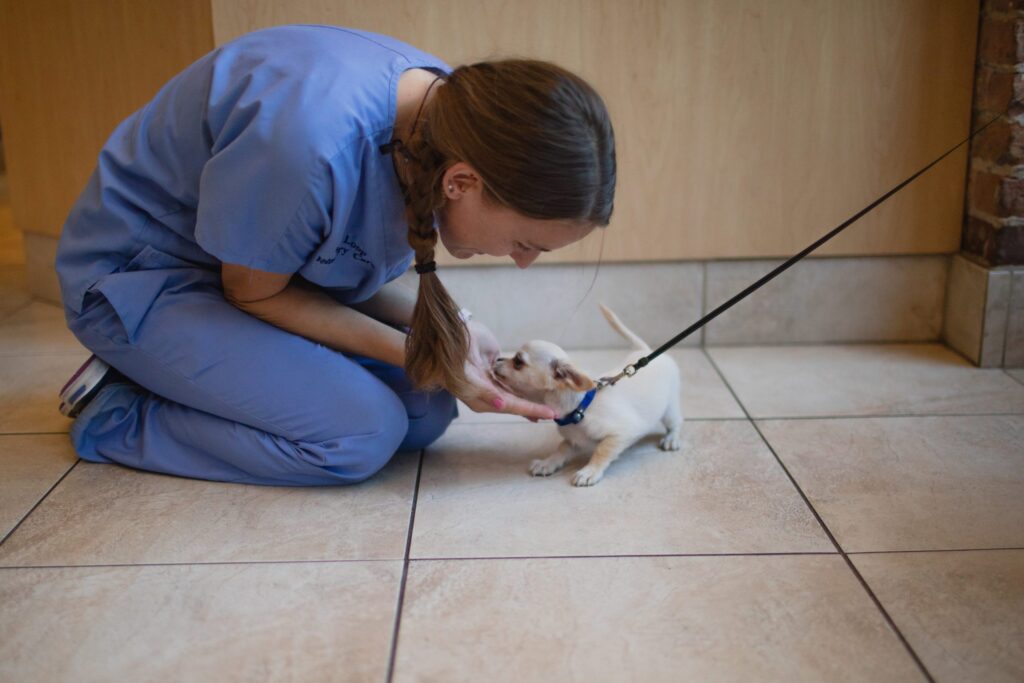West Loop Vet welcomes your New Pet!


Welcome New Pets
One of the positives we are seeing as a result of the COVID -19 pandemic is that people across the country are adopting pets. Having a companion animal can be quite beneficial during this stressful time as owning a pet has shown to help reduce blood pressure and loneliness. This is also a good time to adopt a new animal because many people are at home and have the time to acclimate and train the animal – and the family.
Recommendations for new pet owners
One of the most important steps new pet owners should take when adding a pet to their family is to bring your new pet to your veterinarian for a thorough exam. Your veterinarian should be your partner in the care of your pet. Even if your pet received it’s vaccinations before coming to live with you, a thorough exam is important to identify any potential health issues early and to set a baseline for future care. If an in-person exam is not possible, West Loop Veterinary Care can offer tele-medicine appointments in some instances.
Our veterinarians can provide you with guidance on the proper care of your pet including:
- Vaccinations – rabies are required by law for all cats and dogs, but other vaccinations can also be important. Our veterinarians can help you decide which vaccines are appropriate based on your pet’s age, health and lifestyle.
- Diet – there are some fad diets out there, not all of them are healthy. Our veterinarians can help you select the correct diet for each step of your pet’s life.
- Exercise – veterinarians can guide you on the appropriate type and amount of exercise your pet should have based on its age, health and other factors.
- Pest prevention – even though we’re stuck inside, this is the time of the year when pests are again emerging. After our mild winter, pest prevention is especially important. Fleas, ticks, mosquitoes all carry disease that is harmful to our pets, so pet owners should be sure their pet has the right pest prevention.
- Behavior – Now is the time to put in place the habits that will help you avoid problems later on when we all start spending more time away from home. Your veterinarian can help you with that and can help identify any behavioral issues your new pet is currently exhibiting. If behavioral issues are severe, we can refer you to a veterinarian specializing in animal behavior issues.
Now is the time to socialize your pet and to prepare it to spend time alone so that it doesn’t suffer from separation anxiety and behavioral issues when we all are able to be out and about again.
Training
One really good aspect of adding a pet to the family at this time is that new pet owners have the time to properly train their pets. Most importantly, new pet parents should be consistent, persistent and use positive reinforcement techniques in training their pets. Praise and treats are effective and help build a powerful bond between people and their pets.
Puppies
For puppies, three key things they should learn are:
- Sit
- Down
- Stay
If you use treats, you can use their regular food. Whether it’s the pet’s regular food, or a treat, just use small amounts. Praise and petting also work well.
Kittens
For kittens, it’s helpful to train them to:
- Be comfortable in their travel carrier, so that it becomes easy to take them to their veterinarian. Pet owners can put a cat’s treats and toys in their travel carrier to create a positive association with the carrier for the cat.
- Cats too can learn tricks. Teaching them tricks is a great way to provide mental stimulation for your cat. And it’s a lot of fun.
- Make certain cats have plenty of active play and enrichment toys for mental stimulation.
Both cats and dogs should get accustomed to being groomed, having their teeth brushed and having their paws touched for nail trims. Also look at their eyes and ears periodically so they are accustomed to having those parts of their body handled when they see their veterinarian.
As always, for dogs, use a leash when outdoors and cats should always be kept indoors.
Puppy Potty Training
Some of the most common questions we receive from new puppy owners involve how to train a new puppy to urinate and defecate outdoors. It’s important to have reasonable expectations and a consistent plan for training your puppy. Until your puppy is three to four months old, he or she has little bowel or bladder control, but by being consistent and following a schedule, new puppy owners can limit the number of accidents your puppy has in the house.
Consistency is the key.
The best way to house train a pet is to keep to a schedule. Puppies should always be taken out after:
- Waking up
- Meals
- Playtime
One helpful tool in training a puppy can be a crate. Crates should always be large enough to permit your dog to stretch out flat on his side without being cramped and to sit up and stand without hitting his head on the top. In the instance that a crate is too large for a growing puppy, purchase a crate that comes with a partition so you can adjust it as your puppy grows. If the crate is too large your puppy will sleep in one end and use the other end as a bathroom.
The crate should be placed in or as close to a “people” area as possible, like the kitchen, family room, or bedroom. A young puppy (8-16 weeks) should normally have no problem accepting the crate as their “own place.” Make it clear to all family members that the crate is NOT a playhouse. Its purpose is to be a special and comforting room for the puppy. Puppies should not be disturbed by children in the house when the puppy is resting in the crate.
Establish the “crate routine”, placing the puppy in the crate at regular intervals throughout the day. However, puppies should not be left alone in the crate for more than 3-4 hours. Always remove your puppy’s collar and tags before putting them in a crate because of the possibility of them getting caught in the crate openings and harming the puppy.
Puppies should “earn their space” in the house. As they become trained, they can have more freedom to be outside of the crate and in more areas of the house.
Pets & COVID-19
Although it’s always been a best practice, we want to remind pet owners that now it’s especially important to wash their hands before and after interacting with their pets and with their pet’s food, dishes, toys, bedding, etc. If by chance you are sick with COVID-19, it is recommended that you not interact with your pet and that someone else care for your pet.
We hope these tips get you and your pet started off on a long and joyous relationship for many years to come. Our veterinarians and team members are here to guide and support you every step of the way.
# # #
West Loop:
(312) 421-2275
Streeterville:
(312) 766-5959
